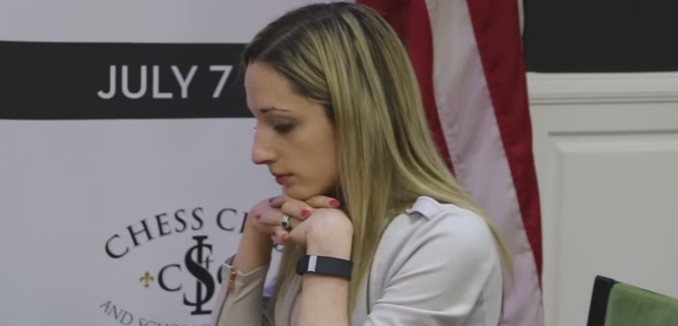The reigning American female chess champion has come under fire after announcing last week that she will boycott next year’s tournament, which is slated to be held in Iran, to protest the requirement that all participants wear the Islamic hair covering known as the hijab.
Nazí Paikidze-Barnes, a 22-year-old originally from the former Soviet republic of Georgia, protested last month’s decision by FIDE, chess’ governing body, to hold next year’s Women’s World Chess Championship in the Islamic Republic, saying she would not participate even though it could hurt her career. “It is absolutely unacceptable to host one of the most important women’s tournaments in a venue where, to this day, women are forced to cover up with a hijab,” she told The Telegraph on Thursday. “I understand and respect cultural differences. But, failing to comply can lead to imprisonment and women’s rights are being severely restricted in general.”
Paikidze-Barnes emphasized her concerns on Twitter by pointing to the U.S. State Department’s warning that Americans traveling to Iran face a “risk of arrest and detention” by authorities. “It’s very upsetting that I have to miss my first Women’s World Championship,” she added.
Paikidze-Barnes received support from Nigel Short, a former British world title contender, who told The Telegraph: “There are people from all sorts of backgrounds going to this, there will be atheists, Christians, all sorts of people. … If you are deeply Christian why would you want to wear a symbol of Islamic oppression of women?”
2017 Women's Wrld Ch. awarded to Iran. Women forced to wear the Islamic hijab, flouting FIDE statutes against sex & religious discrimination
— Nigel Short (@nigelshortchess) September 27, 2016
Carla Heredia, a former Pan-American champion from Ecuador, also supported the U.S. Champion’s stance. “No institution, no government, nor a Women’s World Chess Championship should force women to wear or to take out a hijab,” she said. “This violates all what sports means. Sport should be free of discrimination by sex, religion and sexual orientation.”
Heredia, who did not qualify for the February 2017 championship, noted that Iran’s restrictions could apply to other areas. “The obligation to use hijab is one issue, another one is that women can’t share room with a male if she is not married to him. So the question remains what would happen if women chess players want to share the room with a male coach or if women chess players want to prepare for the game [by] visiting the coach’s room,” she observed.
The Telegraph also reported that the participants in a smaller tournament that FIDE held in Iran earlier this year were “left angry” about being forced to wear the headscarves.
Both FIDE and Iranian chess officials have pushed back against Paikidze-Barnes’ boycott. Susan Polgar, a Hungarian-born American Grandmaster and chair of FIDE’s Commission for Women’s Chess, said that participants should respect “cultural differences.”
“When I visited different places with different cultures, I like to show my respect by dressing up in their traditional style of clothing,” she told The Telegraph. “No one asked me to do it. I just do it out of respect.”
“I personally would have no issues with wearing a head scarf (hijab) as long as it is the same to all players,” she continued, adding that from “my personal conversations with various players in the past year, they had no real issues with it.” She also claimed that in the past, organizers offered “beautiful choices” to participants who were made to cover their hair.
Iranian chess federation president Mehrdad Pahlevanzadeh also criticized Paikidze-Barnes’ decision. “It’s not right to call for a boycott. We are well-prepared to host the event,” he told the Tehran Times.
Paikidze-Barnes wrote on social media on Saturday that she received “a lot of hurtful and even threatening messages” since announcing her boycott, and emphasized that her concerns were rooted in a desire to “defend basic women’s rights,” rather than promote anti-Muslim sentiments.
Thank you all for your support! pic.twitter.com/teHiQK3PHT
— Nazi Paikidze-Barnes (@NaziPaiki) October 2, 2016
A day earlier, she explained on Instagram: “Some consider hijab a part of culture. But I know a lot of Iranian women are bravely protesting this forced law daily and risking a lot by doing so. That’s why I will NOT wear a hijab and support women’s oppression. Even if it means missing one of the most important competitions of my career.” Her remarks were part of an interview with MyStealthyFreedom, which is a social media movement protesting discriminatory laws in Iran.
In addition to protesting the forced imposition of hijabs, MyStealthyFreedom has criticized laws prohibiting women from riding bicycles, which Iran’s supreme leader has claimed will endanger their “chastity” and “exposes society to corruption.”
[Photo: Chess.com / YouTube ]




